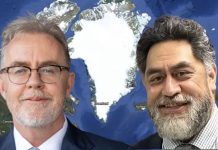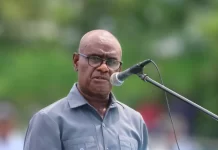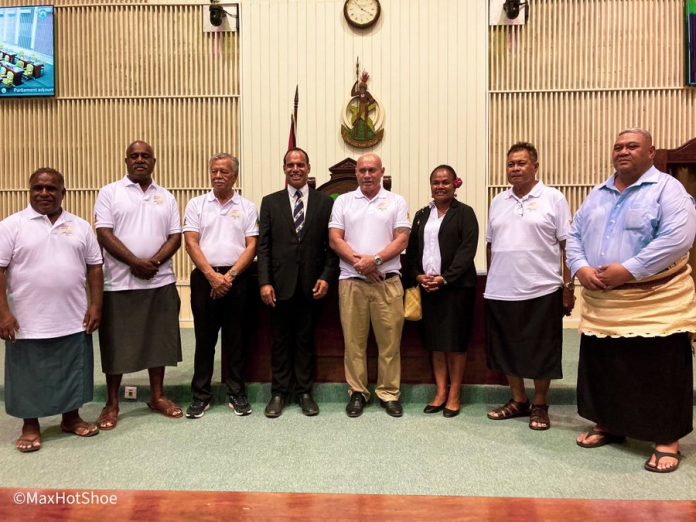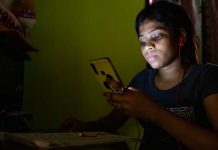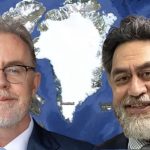We, the Ministers and officials from the Kingdom of Tonga, the Republic of Fiji, Niue, the Solomon Islands, Tuvalu, and the Republic of Vanuatu, met for open, transparent and inclusive discussions with regional and international experts and civil society at the 2nd Ministerial Dialogue on Pathways for the Global Just Transition Away from Fossil Fuels hosted in Port Vila by the Governments of Vanuatu and Tuvalu from 15-17 March 2023.
We are appalled by the fossil-fuel driven consequences of the unprecedented two Category 4 cyclones striking Vanuatu within four days. This is just the most recent example of the extensive and ongoing fossil fuel-induced loss and damage suffered by the people and communities of the Pacific Islands.
The science is clear that fossil fuels are to blame for the climate emergency. This is a crisis driven by the greed of an exploitative industry and its enablers. It is not acceptable that countries and companies are still planning on producing more than double the amount of fossil fuels by 2030 than the world can burn to limit warming to 1.5ºC. As the UN Secretary General has said, fossil fuels are a moral and economic madness.
The Pacific will no longer accept the fossil fuel lie. We have the power and responsibility to lead, and we will. Pacific leaders called for the Paris Agreement to limit warming to 1.5ºC, and have demanded an end to the development and expansion of fossil fuel extracting industries, starting with new coal mines. Pacific civil society has challenged the world to step up the fight for urgent fossil fuel phase out and effective climate action.
As leaders, on behalf of present and future generations, communities on the frontlines and all of humanity, we call for:
1) A Fossil Fuel Free Pacific and a global, just and equitable phase out of coal, oil and gas, including through:
a. Adopting a Pacific Island Forum Leaders Declaration for a Just Transition to a Fossil Fuel Free Pacific as soon as possible, that empowers the Pacific to spearhead the unqualified, global, just and equitable phase out of coal, oil and gas production in line with global temperature goal of below 1.5ºC, including at the UN Secretary General’s climate summit in September, at COP28, and beyond, including the avoidance of terminology such as “unabated” or “inefficient” that creates loopholes for fossil fuel producers and polluters.
b. Joining the Beyond Oil and Gas Alliance and urging major oil and gas producers to join the Alliance, through committing to halting all new licensing rounds for oil and gas, and setting a Paris-aligned end date for production.
c. Calling for a Fossil Fuel Non-Proliferation Treaty and leading the creation of a global alliance to negotiate a new Treaty to govern the end to fossil fuel expansion, equitable phase out of fossil fuels, and a global just transition.
d. Committing to transparently disclose our fossil fuel investment and projects, and demand that all other governments do the same, including through the Extractive Industries Transparency Initiative and Global Registry of Fossil Fuels.
2) New Pacific-tailored development pathways based on 100% renewable energy, including through:
a. Recognising the Pacific’s strong identity, cultural heritage, and Indigenous commitment to environmental and social sustainability, and basing our transition on these traditional values.
b. Referencing fossil fuel phase out explicitly in our Nationally Determined Contributions (NDCs) and Long-Term Low-Emission Development Strategies (LT LEDS), and developing national just transition plans, including through existing multilateral platforms.
c. Dramatically scaling up the deployment of renewable energy and energy efficient technologies across all sectors, including by transforming and scaling up our electricity systems, building on the Framework for Energy Security and Resilience in the Pacific, ensuring energy independence and resource resilience, and enabling sustainable air, maritime and land transport.
d. Urgently decarbonising land transport, including through scaling up the Pacific E Mobility Policy and Programme in our effort to support the decarbonisation of land transport.
e. Calling for strengthening the Pacific Centre for Renewable Energy and Energy Efficiency (PCREEE) and the Pacific Maritime Technology Cooperation Center (MTCC-Pacific) to focus on Pacific-appropriate technology research, innovation and development to Pacific countries in cooperation with relevant partners.
f. Calling for the 5th Pacific Regional Energy and Transport Ministers (PRETMM) meeting to task the Pacific Community (SPC) with developing a regional strategy for carbon free maritime transport in collaboration with initiatives such as the Pacific Blue Shipping Partnership.
g. Working alongside civil society organisations, the private sector and other non-state actors, especially at the grassroots level, to progress the development and implementation of fossil free development pathways.
3)Expanded public and private finance for the just transition from fossil fuels to renewable energy at the scale required, with innovative, simplified mechanisms and reforms of existing financial institutions, including:
a.Calling on international partners to mobilise billions of USD needed in grant based financing and direct investments into the Pacific Island countries to ensure that transitioning out of fossil fuel dependent industries can take place in a just, fair and equitable way, resulting in socially and economically empowering paradigm shifts.
b.Reforming existing international financial institutions and climate finance mechanisms to enable scaled up, timely and easily accessible funding for this transition, and shifting to comprehensive country-wide transformational programming approaches. Financial institutions must be able to handle the climate finance needs of the Pacific to enable a just transition from fossil fuels and support adaptation and loss and damage needs in a rapid and timely manner.
c.Implementing and developing national capacity on innovative means of mobilising finance for a just transition, preferring that, where appropriate, any present, new and future financing for a just transition be mobilised through multilateral development banks and existing facilities, such as the Pacific Resilience Facility.
d.Ending fossil fuel subsidies and other public finance for fossil fuel production globally, and redirecting this finance towards enabling the just transition away from fossil fuels.
4)Redoubled efforts to reaffirm, strengthen and codify legal obligations with respect to the global phase out of fossil fuels, including by:
a.Advocating for the unqualified, global, just and equitable phase out of coal, oil and gas in line with the global temperature goal of below 1.5ºC in all international bodies and legal institutions, particularly for upholding the legal rights of redress of communities and peoples being impacted by the production and consumption of fossil fuels.
b.Calling for all nations to support the adoption of the Pacific’s UN General Assembly Resolution seeking an advisory opinion on climate change obligations from the International Court of Justice, and making submissions to the Court ensuring that legal obligations and consequences related to fossil fuels are clearly articulated.
c.Calling for all nations to support the Commission of Small Island States on Climate Change and International Law in seeking an advisory opinion from the International Tribunal Law of the Sea on international law concerning climate change and sea level rise and obligations of States in protecting and preserving the marine environment.
d.Strengthening the rule of international and domestic law to prevent Ecocide and protect the human right to a clean, healthy, and sustainable environment from environmental degradation related to the extraction, production, supply and use of fossil fuels.
e.Calling for the International Maritime Organisation (IMO) to adopt legally binding obligations to establish a GHG levy that will facilitate the transition to carbon free maritime shipping and provide revenue for affected communities in the Pacific.
Operationalising the Call
To drive the fossil fuel free pathways in this document, we agree to rapidly establish a Pacific Energy Commissioner for a Just Transition to a Fossil Fuel Free Pacific, with senior experienced leadership supported by leading technical experts and a regional taskforce, and funded by allies to a fossil fuel free world, to be formalised by Pacific Island Forum leaders in October 2023.
SOURCE: PICAN/PACNEWS



